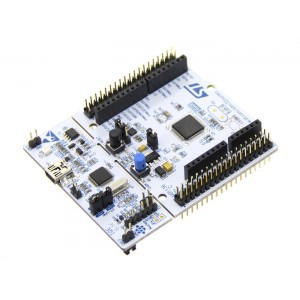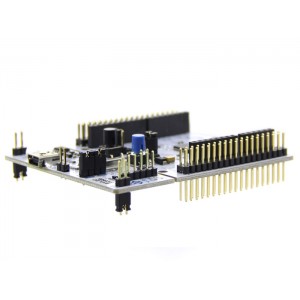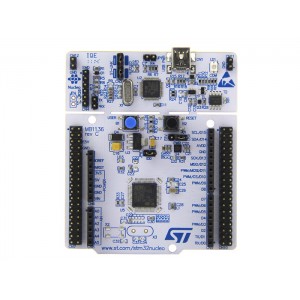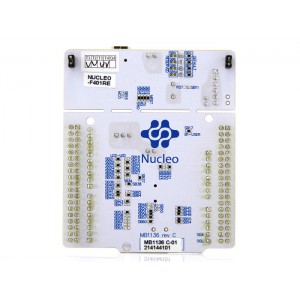The STM32 Nucleo board provides an affordable and flexible way for users to try out new ideas and build prototypes with any STM32 microcontroller line, choosing from the various combinations of performance, power consumption and features. The Arduino™ connectivity support and ST Morpho headers make it easy to expand the functionality of the STM32 Nucleo open development platform with a wide choice of specialized shields.
The STM32 Nucleo board does not require any separate probe as it integrates the ST-LINK/V2-1 debugger/programmer.
The STM32 Nucleo board comes with the STM32 comprehensive software HAL library together with various packaged software examples, as well as direct access to mbed online resources.

Here lists the order codes and the respective targeted MCU.
Order code Targeted MCU
NUCLEO-F030R8 STM32F030R8T6
NUCLEO-F072RB STM32F072RBT6
NUCLEO-F103RB STM32F103RBT6
NUCLEO-F302R8 STM32F302R8T6
NUCLEO-F334R8 STM32F334R8T6
NUCLEO-F401RE STM32F401RET6
NUCLEO-F411RE STM32F411RET6
NUCLEO-L053R8 STM32L053R8T6
NUCLEO-L152RE STM32L152RET6
The meaning of NUCLEO-TXXXRY codification is as follows:
- •TXXX describes the STM32 MCU product line
- •R describes the pin count (R for 64 pins)
- •Y describes the code size (8 for 64K, B for 128K, E for 512K)
The order code is printed on a sticker placed at the top or bottom side of the board

Key Features
- STM32 microcontroller with LQFP64 package
-
Two types of extension resources
- Arduino Uno Revision 3 connectivity
- STMicroelectronics Morpho extension pin headers for full access to all STM32 I/Os
- mbed-enabled (mbed.org)
-
On-board ST-LINK/V2-1 debugger/programmer with SWD connector
- selection-mode switch to use the kit as a standalone ST-LINK/V2-1
-
Flexible board power supply
- USB VBUS or external source(3.3 V, 5 V, 7 - 12 V)
- Power management access point
-
Three LEDs
- USB communication (LD1), user LED (LD2), power LED (LD3)
- Two push buttons: USER and RESET
-
USB re-enumeration capability: three different interfaces supported on USB
- Virtual Com port
- Mass storage
- Debug port
- Comprehensive free software HAL library including a variety of software examples
- Supported by wide choice of Integrated Development Environments (IDEs) including IAR, Keil, GCC-based IDEs
Documents
- Product specifications DB2196: STM32 Nucleo boards
- User manual UM1724: STM32 Nucleo boards
- User manual UM1727: Getting started with STM32 Nucleo board software development tools
- Board manufacturing specification
- Bill of Materials
- Schematic Pack
- Flyer: STM32 32-bit MCU family
- License agreement








